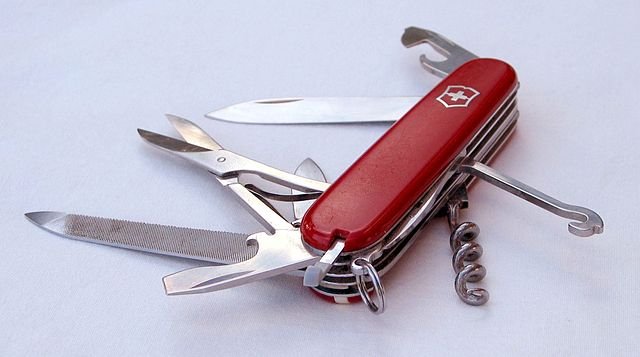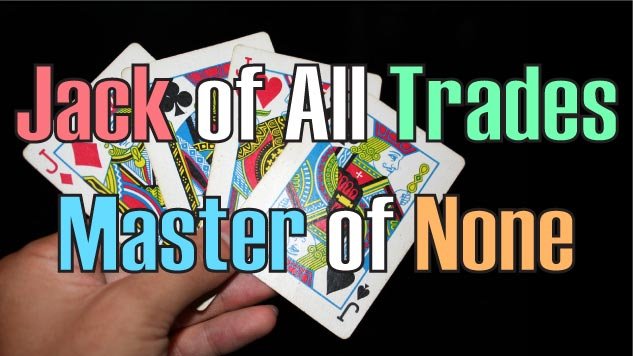Specialization and Generalization - Know a Lot About a Little, or Know a Little About a Lot?

It's generally recognized that getting ahead in a career, requires dedication to attain excellence, expertise or mastery in that domain. It's estimated that 10,000 hours is a general rule to master a field.
This is the specialization that has led to the progress of civilization. Imagine if everyone was doing things on their own. All of our time would be spent in doing everything ourselves. But, when we outsource and specialize our own talents, and then exchange with others, we tend to have extra time left over.
Specialization allows faster progression as a species/culture and saves us time in our daily lives, in general. But what are the costs?
Specialization tends to focus all learning on one thing, or immediately adjacent related topics to enhance the primary field. Although mastery of a particular field may be had, the overall mastery of integrating several bodies of knowledge about reality into a syncretic view, may be lacking.
When learning from many trades/fields instead of just one, we are able to link the individual disciplines into a holistic practical approach to life in general. Over-specialization can be a detriment. Let's not forget how compartmentalization works in organizations, whether corporate, military or political, information and decisions are compartmentalized often on a need-to-know level of secrecy. Certain information is power.
There is the phrase:
"Jack of all trades, master of none".

This is to reference a general competency in all abilities as opposed to one in particular.
The phrase can also be changed to blend specialization and general competency as:
"Jack of all trades, master at some."
This way, you can be competent in general, while also being a specialist in one or a few fields where you surpass the knowledge of the general person.
Think of it like being a Swiss Army Knife, or Boy Scout. You're always prepared and competent to deal with anything because your array of knowledge spans a large area.

In some situations, nonexperts can make better predictions than experts, says professor Philip Tetlock from the University of Pennsylvania. Not predictions about a highly specialized task like surgery, but of contemporary problems that require thinking across a spectrum. Narrow vision can block seeing the forest from the trees.
Being neither a pure generalist or pure specialist, means being in a new category called polymaths. Generally, this is when you branch off into other domains after having specialized in one field of study. Another term is flexperts, for being flexible in the expertise you have acquired.
Humans can reach their fullest potential, not by revering a specialist compartmentalized way of living, but by broadening to understand reality in more ways to integrate a larger view of how things function overall. There is much variability, multiplicity and diversity in existence and life. Having more broad general skills, rather than less skills but more specific, can be very advantageous.
There is too much to know in the universe. Breaking things up and choosing one thing over another (i.e. scire, science, knowledge), allows us to speed up the progression of knowledge and collectively progress as a species. Dividing tasks up gives us more freedom in that way. But it also creates more dependence and therefore less self-sufficiency and less freedom as well. We depend on society to survive. Very few in the modern world are now capcble of survival if society would break down. Like many things I talk about, it's dual, with both positives and negatives to each side.
Thank you for your time and attention! I appreciate the knowledge reaching more people. Take care. Peace.
If you appreciate and value the content, please consider:
Upvoting  , Sharing
, Sharing  and Reblogging
and Reblogging  below.
below.
 me for more great content to come! Please also go through my older work to learn about more topics.
me for more great content to come! Please also go through my older work to learn about more topics.
Author: Kris Nelson / @krnel
Contact: [email protected]
Date: 2016-11-04, 8am EST
I grew up in a household where specialization was encouraged, but I have always been so curious that it was not possible for me. Now, at 53, I'm thankful I have so many skills. I've even mastered a couple! Great article, btw.
Up/fol
Great to hear! Thanks for the feedback and that your own understanding that diverged from the conditioning being imposed upon you resulted in a better version of yourself in the long run. Knowledge is power. Knowing more about everything is great! Take care. Peace.
I believe that it is good to be an expert in one field, but it is also important to keep an eye on what is going on around that field. It is probably very hard to know a bit about everything as everything is too vast. But it makes sense to discuss one field + the connected fields.
Good thoughts on this topic.
You really think so? I often wonder if it's the opposite. So many today don't even have basic knowledge of how an engine works, construction, changing a light switch, splitting wood, etc. Some have the funds to just hire folks for virtually everything. But most either have to put it off or need to be willing to tackle it themselves. They're ripe for being ripped off because of a lack of basic understanding.
I'm on the same page as @areynolds (he has me by two years ;) ). My curiosity and desire to learn has me changing all the time. I do what I have to in order to put food on the table, but avoid punching a clock so I can keep pursuing freedom and learning new things.
That's why there's two sides to the issue, on both ends positive and negatives.
Try to do everything yourself. Get your own water, food, make your own clothes, do it all yourself, no one is allowed to help you. Build your own road. Make your own car. That's the extreme of a world without specialization. You are taking it to another extreme to make a point, which I get. That's when people specialize too much, and that's the point of the post, for why generalization is needed. We outsource a lot, we do something in exchange others do others things. That's the basics of specialization.
I think basic skills in a wide array of areas is helpful. But I think basic knowledge in a wide array of areas is very important. So, kinda yea and kinda no. :)
Your statement that I quoted struck me though. Perhaps I applied it too narrowly?
This post has been linked to from another place on Steem.
Advanced Steem Metrics Report for 4th November 2016 by @ontofractal
The Daily Tribune: Most Undervalued Posts of Nov 04 - Part II by @screenname
Learn more about and upvote to support linkback bot v0.5. Flag this comment if you don't want the bot to continue posting linkbacks for your posts.
Built by @ontofractal